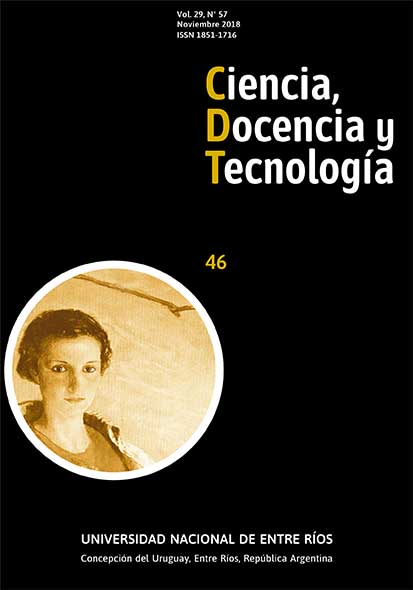Abstract
At present, there is much talk about ICTs, some tend to be technophiles, are considered devotees and defend their incorporation into teaching. On the other hand, there are skeptics of the "goodness" they offer, they paint them as "risky". Thus, we can not forget that every innovation has a certain duality which is not alien to ICT, besides being a contribution to techno-scientific progress in human life, they do not escape the problems that have revealed the ethical and moral assumptions that constitute the Basis of our current society. Therefore, in this research, it is sought to investigate the uses that ICT students make in their daily contexts, especially the academic. An exploratory study was carried out, information was obtained from 92 middle school students and there were techno-theoretical problems that have to be addressed since they affect social and school relations.
References
Adell, J. (1998). Nuevas tecnologías e innovación educativa. Organización y gestión educativa, (1), 3–7.
Bunge, M. (1977). Towards a Technoethics. Minist, 96-107.
Cabero, J. (1998). Impacto de las nuevas tecnologías de la información y la comunicación en las organizaciones educativas. Lorenzo, M. y otros (coords): Enfoques en la organización y dirección de instituciones educativas formales y no formales, 197–206.
Cabra-Torres, F., & Marciales-Vivas, G. (2011). Internet y pánico moral: revisión de la investigación sobre la interacción de niños y jóvenes con los nuevos medios. Universitas Psychologica, 10(3), 855–865.
Cortés, P. P. A. (2005). Las preconcepciones sobre la tecnoética en los adultos. Revista Mexicana de psicología, 22(2), 541–552.
ECPAT International. (2012). Riesgos y vulnerabilidad en línea. Latinoamérica.
Flores, F. J. (2011). Por un uso seguro y saludable de Internet, la telefonía móvil y los videojuegos - Por una ciudadanía digital responsable. Recuperado 19 de marzo de 2016, a partir de http://www.pantallasamigas.net/proteccion-infancia-consejos-articulos/sexting-una-practica-de-riesgo.shtm
Londoño, D. M. I. (2014, marzo 17). Ciberbullying o Acoso Cibernético y La Ley 1620 en Colombia. Recuperado a partir de http://blogs.colombiadigital.net/digiapuntes/ciberbullying-o-acoso-cibernetico-y-la-ley-1620-en-colombia/
Luppicini, R. (2009). The emerging field of technoethics. Handbook of research on technoethics, 1–19.
Mera, A. (2014, junio 22). El ciberacoso, un fenómeno que crece a la velocidad de Internet. Recuperado 16 de julio de 2016, a partir de http://www.elpais.com.co/elpais/cali/noticias/ciberacoso-fenomeno-crece-velocidad-internet
MinTIC. (2009). Ley 1341 de 2009: Ley TIC. Recuperado a partir de http://www.mintic.gov.co/portal/604/w3-article-3707.html
MinTIC. (2012). En TIC confío. Bogotá.
Murcia, G. J. (2014, octubre 16). Uso saludable de internet (internet también puede ser saludable) [online]. Recuperado 25 de mayo de 2016, a partir de http://goo.gl/DF55Zx
Panizo, G., Victoria. (2011). El ciber-acoso con intención sexual y el child-grooming. Quadernos de criminología: revista de criminología y ciencias forenses, (15), 22–33.
Rosell, M. C., Sánchez-Carbonell, X., Jordana, C. G., & Fargues, M. B. (2007). El adolescente ante las tecnologías de la información y la comunicación: internet, móvil y videojuegos. Papeles del Psicólogo, 28(3), 196-204.
Sampieri, R. H., Collado, C. F., Lucio, P. B., & Pérez, M. de la L. C. (2010). Metodología de la investigación (Quinta Edición). México: McGraw-Hill México. Recuperado a partir de http://www.univo.edu.sv:8081/tesis/021552/021552_Cap3.pdf
Sierra, G. L. I. (2009). Alcances de una ética en el ciberespacio o el «giro» hacia una «ética floreciente». Signo y Pensamiento, XXVIII(55), 92-107.
UNESCO. (2006). Ética de la Ciencia y la Tecnología. Recuperado a partir de http://www.unesco.org/bpi/pdf/memobpi44_ethics_es.pdf
UNICEF. (2014). Grooming: guía práctica para adultos. Recuperado a partir de http://www.unicef.org/argentina/spanish/guiagrooming_2014.pdf
UNICEF. (2016). Innovaciones con TICS. Recuperado a partir de http://www.unicef.org/argentina/spanish/education_25411.htm
Vanguardia Liberal. (2012). Colombia es uno de los países con mayores cifras de «matoneo». Recuperado a partir de http://www.vanguardia.com/actualidad/colombia/148157-colombia-es-uno-de-los-paises-con-mayores-cifras-de-matoneo
Vila, I., & Casares, R. (2009). Educación y sociedad. Una perspectiva sobre las relaciones entre la escuela y el entorno social. Cadernos de Educação, 57.

This work is licensed under a Creative Commons Attribution-NonCommercial-ShareAlike 4.0 International License.
Copyright (c) 2017 Willy Jharinton Vivas

